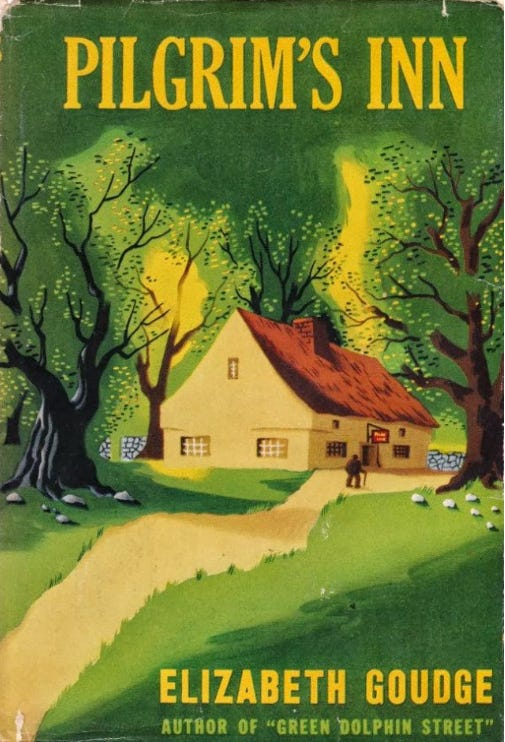Am I allowed to share huge block quotes from one of my favorite authors here? Will I be breaking any copyrights? Well, Elizabeth Goudge is with us no more, and I don’t think she’d care if I shared quotes from her excellent book, Pilgrim’s Inn. This book was my grandmother’s, and it’s all the more special now that it has been a year since her passing.
Nothing much happens in this book plot-wise. However, Goudge’s characters and the message of redemption and rebirth are so beautifully woven through the gently meandering storyline that I don’t mind the slowness. Here’s a collection of my favorite quotes. I apologize for the swear word in the first one, but it sure made me laugh. By the way, Pilgrim’s Inn is also known as the Herb of Grace and is the second book in a two-part series. The first book is called The Bird in the Tree.
“…the holidays in the exceedingly expensive hotels, which her father preferred, were not much to her taste. John Adair had little liking for the simple life; he said it was not simple, but the most damnably complicated method of wasting time that had ever existed. He liked a constant supply of hot water, a refrigerator, an elevator, an electric toaster, a telephone beside his bed, central heating and electric fires, and anything whatever that reduced the time spent upon the practical side of living to a minimum and left him free to paint. But Sally did not want to be set free for anything, for it was living itself that she enjoyed.”
“…I know of no better incentive for the building of a decent world than the possession of children who must live in the world you’ve built.”
“…they were talking about the deplorable state of the world, about that terrible bomb, about famine and inflation and chaos and death, and her mind shied away from their talk like a terrified horse. She couldn’t do anything about it now, at eighty-six, except pray, and in between her prayers, now that the war was over, she wished they would let her forget sometimes that things had not turned out as well as one had hoped, and enjoy the things that were left: the spring sunshine slanting into the quiet room and lighting up the flowers, the lovely ripe corn color of [the dog’s] coat, the hot tea, the log fire burning on the hearth, whispering and fragrant, the feel of the dear old [dog’s chin] resting on her shoe, the sound of the sea coming in the pauses of their talk.”
“Lucille knew always, and Nadine knew in her more domesticated moments, that it was homemaking that mattered. Every home was a brick in the great wall of decent living that men erected over and over again as a bulwark against the perpetual flooding in of evil. But women made the bricks, and the durableness of each civilization depended upon their quality, and it was no good weakening oneself for the brick-making my thinking too much about the flood.”
“What they needed, Lucille considered, was either new homes and new jobs, or else the infusion of some fresh spirit into the old things that should transform them like water poured into wine. Everywhere, in everything, there must be rebirth, and it was her business as head of the Eliot family to do what she could to make it anew before she died.”
Keep reading with a 7-day free trial
Subscribe to Abby's Pep Talks to keep reading this post and get 7 days of free access to the full post archives.




